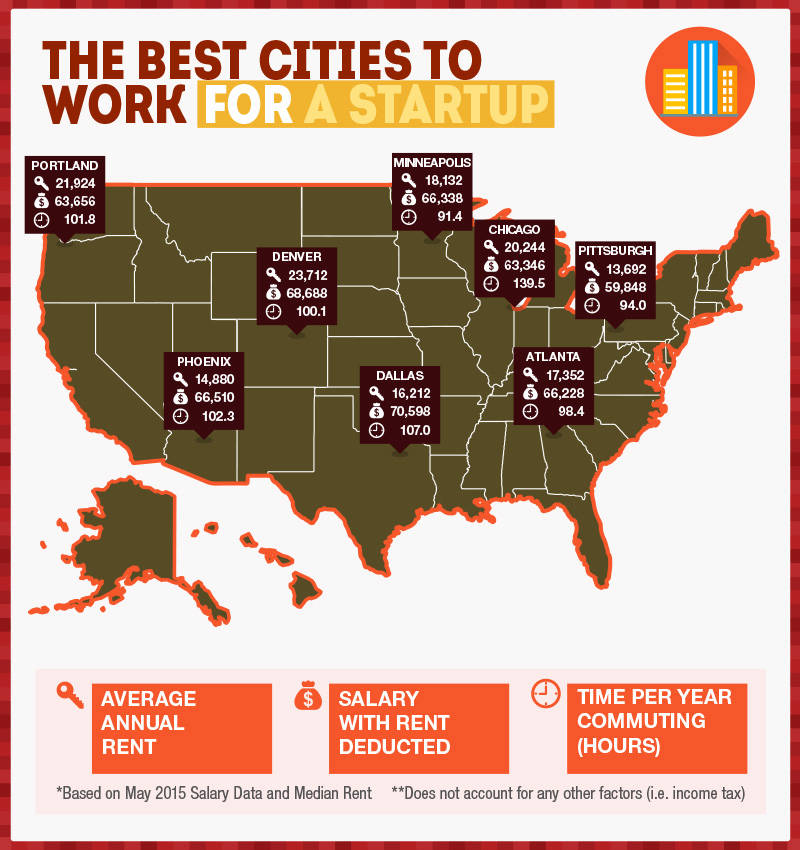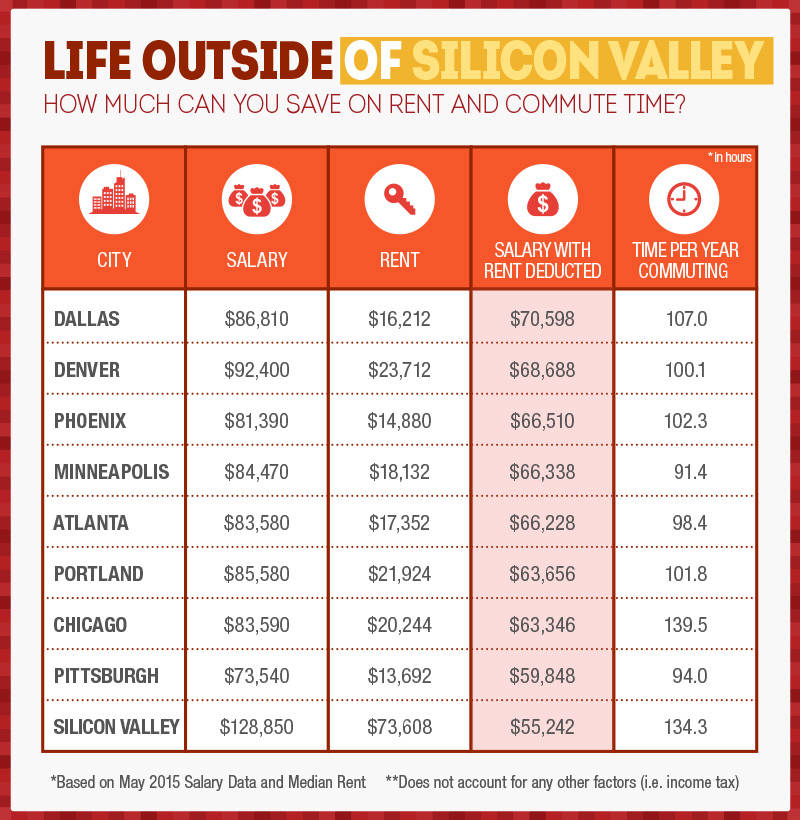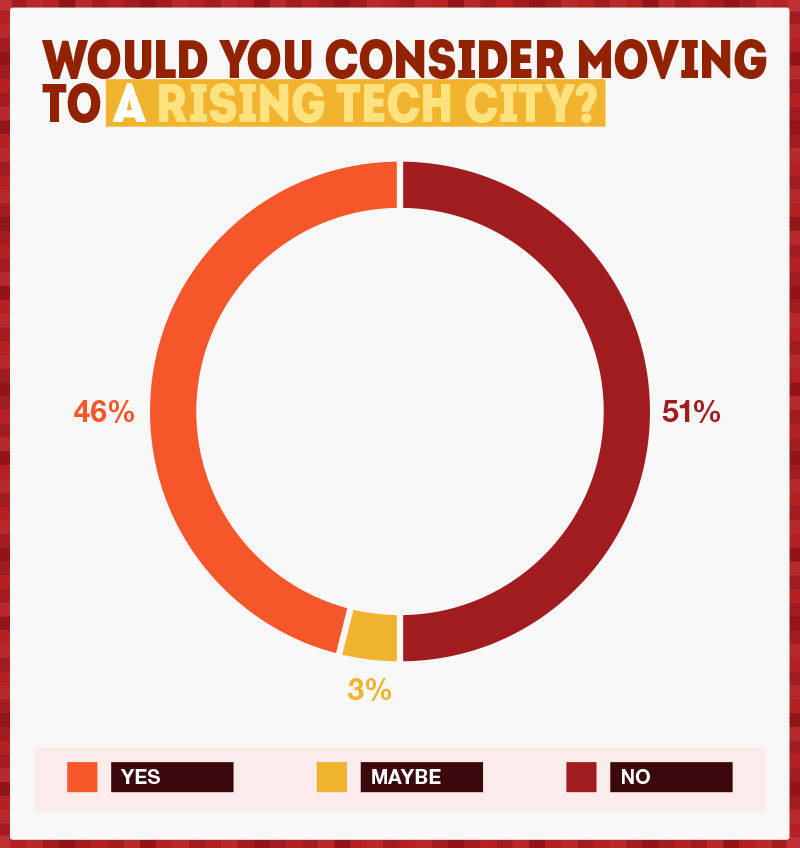“History suggests that when technology shifts happen, new geographic leadership can emerge. Life Science allowed for the emergence of San Diego and South San Francisco. More recently, social media and cloud computing allowed New York to take back the East Coast mantle from Boston and for the City of San Francisco to take over from further south in Silicon Valley as the center of gravity.” — Eric Daimler (PhD); White House Presidential Innovation Fellow at Office of Science & Technology.
Tech is constantly evolving, the industry is constantly shifting, interview questions for millennials are getting tougher and, in 2016, it seems like the desire to work with tech startups has never been greater. Unfortunately, the cost of living in the world’s tech epicenter — Silicon Valley and San Francisco — has never been higher. Other major U.S. cities such as NYC, Seattle (home of Amazon), and to a lesser extent Boston and Austin are also becoming oversaturated with tech companies.
With this in mind, Rentable has conducted a study to find the best American cities to launch a career outside of the major U.S. tech hubs.
A list of the eight best cities outside of the major U.S. tech hubs — with Silicon Valley listed for reference — has been formulated based on approximately 1,500 user comments from Y Combinator’s Hacker News forum and feedback from tech workers and entrepreneurs across the country. Notable factors which affect the desirability of each city include:
- Number of startups
- House prices
- Rent prices
- Commuting
- Health ranking
- Salary
*Y Combinator is the largest Seed Accelerator (funding platform for startups) working in Silicon Valley. Since its inception in 2005, it has funded over 1,000 startups, resulting in a combined business value of over $65 billion. Notable success stories from Y Combinator include the popular news and social entertainment site Reddit, the file-hosting service Dropbox and the online vacation marketplace Airbnb; the latter two of which are currently valued at over $10 billion and $20 billion respectively.
THE BEST CITIES TO WORK FOR A STARTUP


1. DALLAS, TX
City Sentiment: 95.00% positive
*City Sentiment is determined by the number of positive comments (extracted from Y Combinator’s Hacker News forum) in relation to a number of key factors for each city, including environment, cost of living, tech/startup scene, culture, things to do, education, food and drink, friendliness, family life, and transport.
Tech in Texas is ubiquitously associated with Austin, home base of SXSW and major tech companies such as Dell and Indeed. However, in recent years Dallas has certainly been giving it a run for its money, and the general consensus among tech workers is that it will soon surpass Austin as a major player within the tech scene. Currently, Dallas is home to major startups SoftLayer, which was acquired by IBM for $2 billion in 2013, and more recently, online marketplace 5miles.
Regarding the increasing number of tech companies being established in Dallas, one commenter claims that “Tech jobs are very easy to come by and the tech scene in Dallas has been steadily growing over the last 7+ years.” Another commenter echoed the sentiment, stating, “I would consider Dallas over Austin, just from the sheer growth and potential Dallas has. The tech/startup scene has exploded over the last 3 years. No state income tax, low cost of living. Dallas also has the highest growth percentage in the nation.”
The low cost of living and rapid growth of new and innovative tech businesses are attracting more and more tech workers to the city, making Dallas one of the best locations for workers looking to kickstart their tech career or become part of something new and exciting like awesome side gigs.
City Sentiment: 90.00% positive
Home to Carnegie Mellon University, one of the world’s most prestigious computer sciences schools, Pittsburgh is currently experiencing a major tech boom and offers a strong sense of community and work-life balance. Pittsburgh was voted as one of the top 20 healthiest cities in the country by Forbes (#17) and boasts house prices around 20% lower than the national average. With major offices for tech giants such as Google (the company’s third largest in the country), Apple, Facebook, and Uber, there’s a reason why tech workers are migrating to the ‘Steel City.’
It’s not only these tech giants that are providing jobs within the city, however. Alongside a number of emerging robotics and AI companies, one notable tech startup coming out of Pittsburgh is the free language learning platform DuoLingo. According to Luis von Ahn, the founder of DuoLingo, the benefits of working in Pittsburgh include low competition for A-grade employees and easy availability of outside ideas. “DuoLingo a better company because of Pittsburgh,” he says. “Don’t get me wrong, I love Silicon Valley. But it always strikes me when I go there how much everybody thinks exactly the same as each other (most even dress the same as each other). While some herd mentality is ok, I think there is huge benefit to being outside of that bubble.”
City Sentiment: 85.71% positive
With the lowest commute time in our list, Minneapolis gives its tech workers even more time to enjoy their city and take advantage of all that it has to offer. Ranked as the healthiest city in the U.S. by Forbes, Minneapolis has very low air pollution levels and boasts plenty of open green space along with fantastic bike paths and walking areas. Minneapolis also has one of the lowest rates of unemployment in the country (~3%), meaning that there is no shortage of jobs. All of this, combined with affordable housing prices and a progressive “work-life balance” mentality (being host to events such as the annual Work/Life Expo), makes Minneapolis one of the country’s most desirable places to live.
Lifestyle aside, Minneapolis is also known as the birthplace of industry giants Target, Best Buy, and General Mills. However, the city has also developed a small but successful and growing startup scene in recent years with the launch of tech companies such as The Nerdery, which provides custom software design and development solutions, and the backup software/online storage solutions provider Code42.
4. CHICAGO, IL
City Sentiment: 83.78% positive
“Chicago has tons and tons of startups, and a startup culture” is the sentiment of one local tech worker, and the city certainly does seem to be growing in popularity for those who are looking for a thriving startup scene, along with cheaper housing and a strong sense of community. Furthemore, a recent study on venture capital returns conducted by found that Chicago generates the best returns for venture capitalists in the entire country, outpacing New York, Seattle, and even the Bay Area.
Notable startups based in Chicago include global coupon (if you’re not familiar, it’s time to learn how to start couponing) marketplace Groupon, which turned down a $6 billion buy-out offer from Google back in 2010, and online/mobile food ordering company GrubHub. For the past several years, local startups in the city have received large levels of fundings and investments, often exceeding $1 billion annually, with a record $1.72 billion invested into the local tech scene in 2015.
5. DENVER, CO
City Sentiment: 83.34% positive
Denver has often been compared to a mini Silicon Valley, and we wholeheartedly agree with this sentiment. With Denver, Boulder, and Fort Collins, Colorado has the highest number of digital patents outside of California. This state truly is a tech force to be reckoned with.
Denver itself offers an exceptional quality of life with its close proximity to the Rocky Mountains (offering fantastic winter sports), the great weather (more sunny days than Miami), and commitment to health and fitness (ranked #5 healthiest U.S. city by Forbes). At the heart of the Mountain States, Denver is relatively centrally located within the U.S., making it a prime location for many new businesses. It’s no wonder the city’s population has increased by 13.8% since 2010 (adding approximately 83,000 people) and by 2.8% in 2015 alone (18,582 people).
Aryana Jealeh, marketing manager for Denver based IT company Eboxlab, states that “now is the best time for any tech company to move here. Over the past 10 years, the city has been continually growing, but even more so in the past 12 months.” He went on to say, “The constant growth of population means that the tech client base is constantly growing, and therefore has led to an increase in demand for products that startups offer. As a result, the tech community is thriving. We’re surrounded by smart, innovative, and creative peers, and we meet new people every day. Denver has brought these people here through its unique culture.”
6. ATLANTA, GA
City Sentiment: 82.36% positive
Atlanta was one of the most discussed cities within our data results, primarily due to the lifestyle available to residents of the city. One commenter referred to Atlanta as a “job oasis of the south,” and another went so far as to say, “I personally feel like the city has about 5x the culture and character of either Seattle or SF.” However, they went on to elaborate that it’s “probably a preference on type of culture than absolute value of culture.” The quality food, great schools, and green city center all contributed to making Atlanta desirable. It was also ranked as #18 healthiest city in the country by Forbes.
Notable startups hailing out of Atlanta include the global bitcoin payment service provider Bitpay and major email marketing service provider MailChimp. The Atlanta tech village located in Buckhead is also home to a number of promising startups.
7. PHOENIX, AZ
City Sentiment: 82.15% positive
Phoenix has made the list due to its beautiful weather, wide open spaces, relatively low cost of living, and growing tech community. One of the recurring themes in the comments is the supportive broader community that brings together people from different industries. In recent years, both state and local government in the Phoenix metropolitan area have made a significant investment in the technology sector, as evidenced by the rise of institutions such as the , which is located in Scottsdale.
Furthermore, since the city already has a well established hardware infrastructure, it’s been easy for major companies such as Google and Yelp to open up offices in the Phoenix metro area. Danny Estavillo, Business Development Director at The Nerdery, states that “there are many VCs such as Greyhawk Capital Partners and Desert Angels that continue to look to look at tech as a key investment opportunity. Firms such as WebPT and Tuft & Neddle have started to reshape downtown Phoenix and create a culture of entrepreneurship. As startups continue to look to Phoenix as a prime area of growth and opportunity, so too do the tech companies that fuel these startups success.”
8. PORTLAND, OR
City Sentiment: 69.23% positive
Portland has become a popular destination for the tech industry due to the lifestyle available, its status as one of America’s healthiest cities (ranked #4 by Forbes), fantastic public transport (voted the best in the country 2007–2015), a pedestrian friendly city-center, and a generally forward-thinking work culture of entreprenuership (home of PDX WIT). Furthermore, Portland was ranked eighth best-performing large city by the Milken Institute, a Santa Monica-based economic think tank.
Portland is home to a number of successful global startups, such as Survey Monkey and online technology school Treehouse, as well as major offices for Fortune 500 companies such as Apple, Amazon, and eBay. Portland is also home to a growing health-tech scene, with a host of companies looking to address drug-resistant diseases and create platforms for digital checkups between appointments.
Another draw to this city is its location. Dave Shanley, co-founder and CEO of data intelligence platform Notion, states that “West Coast companies have a strong advantage due to their proximity to the Bay Area, and Portland, specifically, is well positioned.” It only takes 90 minutes to fly from Portland to the Bay, which is actually a shorter commute time than the farthest stop on the Google bus route.
LEAVING THE BUBBLE

Rentable asked tech workers based in California whether they would consider moving from the state to another state or city with an emerging tech scene. Over 100 participants were surveyed and the results found that almost half of the respondents would consider relocating from California, for three key reasons:
- The expense of housing.
- The opportunity to be a part of a rising tech scene.
- To be closer to family and be around people with new ideas.
The results of the survey demonstrated a correlation between the respondents’ answers and their current salaries. Respondents in the lowest earnings bracket showed the highest interest in leaving California, mostly due to the opportunity of new tech scenes and the cost of living in the area where they live. Those earning higher salaries were less open to the idea of relocation.
Another major factor was job security. As a project manager working out of the Silicon Valley head office of a top 10 global software company put it: “At a certain level of seniority within a business, to earn the same salary and have the same amount of options available outside of Northern California is difficult.”
Elaborating further, the employee went on to say that “relocating from Silicon Valley as a junior or while still early on in your career can be a good idea, but if you were to do it as a manager and something went wrong, you’d struggle to find positions offering the same salary and responsibility in one of the smaller tech hubs.”
CONCLUSION
The general consensus from this study is that Silicon Valley and San Francisco are too expensive for many tech workers. With sky-high rent prices and a general cost of living significantly higher than many other areas of the U.S., it might only be a matter of time before the bubble bursts. Other major hubs, such as NYC and Seattle, are still oversaturated with tech companies, causing the cost of living to only increase.
For many of its residential tech workers, the air around the global tech hub that is Silicon Valley might have turned sour. Looking into the darker side of the valley, former startup owner (who also worked for both Facebook and Twitter) and author of Chaos Monkeys Antonio García Martínez suggests in his book that “the highest hopes for the majority of startup founders in the valley is just getting a job interview at Twitter or Facebook.” Books like Chaos Monkeys depict Silicon Valley as being completely oversaturated with tech startups, most of which are unfortunately destined to fail.
METHODOLOGY
The criteria for this selection of cities was based on comments in three forum discussions on Y-combinator’s Hacker News, taking note of the general sentiment of each comment and any key features that were mentioned.
A further survey of 100 residents of California who work in the tech industry has been conducted to provide further validation of the selection and reasoning.
To complement the surveys and comments, we collected specific quantitative data to measure the cities’ livability and attractiveness to new employees, including:
- Number of startups
- Median house price
- Median monthly rent
- Average commute time
- National health ranking
- Median salary (Computer & Mathematical)
With this data, we independently reviewed each city for its merits for both startups and individuals to live there. As a reference point, the same data was collected for Silicon Valley considering its status as the largest tech startup hub in the U.S. Where available, the data was also collected to allow comparison to the national average.
The number of mentions (positive, neutral, or negative) was tallied up from the Y Combinator forums for cities outside of Silicon Valley with either upcoming or well established tech scenes. Sentiment analysis determined the cities with the highest number of positive mentions relating to the key factors that were set out (environment, cost of living, tech/startup scene, culture, things to do, education, food & drink, friendliness, family life and transport).
SOURCES
- Silicon Valley Competitiveness and Innovation Project – 2016 Update
- https://angel.co/companies
- Bureau of Labour Statistics, Local Area Unemployment Statistics
- Bureau of Labour Statistics, May 2015 Metropolitan and Nonmetropolitan Area Occupational Employment and Wage Estimates
- https://www.cnbc.com/2016/05/10/expect-layoffs-consolidations-in-silicon-valley-sacca.html
- Y Combinator, Hacker News Forum
- https://news.ycombinator.com/item?id=11247368
